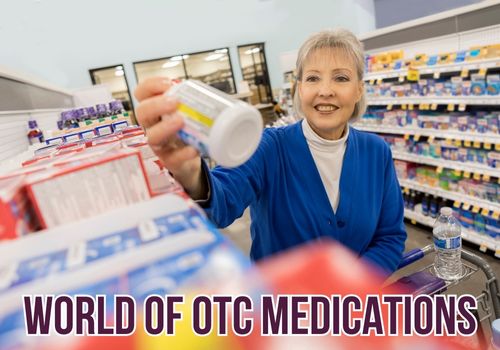Over-the-counter (OTC) medications have become an increasingly popular solution for individuals seeking to manage their health and well-being. These products offer numerous advantages, such as accessibility, affordability, and convenience, and can be used to address a wide range of health issues. However, as with any form of self-medication, there are potential risks associated with the use of OTC medications. This article will explore the growing trend of over-the-counter medications and discuss the associated benefits and risks, and tips for their safe use.
Contents
Growing Trend of Over-the-Counter Medications
Reasons for the rise in popularity of over-the-counter medications
The popularity of OTC medications has surged in recent years due to several factors. First, the convenience of purchasing these products without a prescription appeal to many individuals, saving time and effort. Second, the cost of OTC medications is generally lower than prescription medications, making them more accessible to a broader range of people. Finally, increased public awareness of health and wellness has contributed to the growing demand for OTC products.
Examples of common over-the-counter medications
Some common over-the-counter medications include pain relievers, allergy medications, antacids, and cough suppressants. Over-the-counter tooth pain medication and antibacterial medication are also popular choices for managing dental pain and minor infections.
Connection to self-medication and potential risks
The increased use of over-the-counter medications is closely related to the self-medication trend. While self-medication can provide an affordable and convenient solution for some health issues, it also carries potential risks. These risks include overuse, misuse, and delayed or incorrect diagnosis and treatment of underlying health problems.
Over-the-Counter Tooth Pain Medication: Risks and Benefits
Benefits of over-the-counter tooth pain medication
Accessibility
Over-the-counter (OTC) tooth pain medications are readily available at local pharmacies, grocery stores, or online retailers, contributing to their high accessibility. These medications do not require a prescription, making them a go-to solution for many dealing with sudden tooth pain. The absence of time-consuming doctor appointments and the easy purchase process provides immediate access to relief, which is particularly beneficial for those with demanding schedules or in locations with limited healthcare facilities.
Affordability
In terms of economic feasibility, OTC tooth pain medications stand out. They are typically priced lower than prescription drugs, making them an attractive choice for many individuals, especially those without dental insurance or on a tight budget. This cost-effectiveness extends the reach of dental pain relief options to a broader segment of society, contributing to overall healthcare affordability and potentially lessening the financial burden of unexpected dental emergencies.
Quick relief
Over-the-counter tooth pain medications are formulated to offer quick relief from discomfort. They act rapidly on the site of pain, reducing inflammation and providing an immediate numbing effect. This prompt action allows individuals to continue with their daily tasks with minimal disruption. Moreover, quick relief helps to reduce stress and anxiety associated with dental pain, making it a practical solution for managing acute episodes of toothache.
Risks of over-the-counter tooth pain medication
Overuse and potential side effects
While the accessibility of over-the-counter (OTC) tooth pain medications provides immediate pain relief, it can also potentially lead to overuse. Regular and excessive intake may result in a variety of negative side effects. For instance, gastrointestinal issues such as stomach ulcers and bleeding can occur. Furthermore, certain OTC drugs, when consumed excessively, may cause liver damage, emphasizing the importance of adhering to recommended dosage guidelines. Overreliance on these medications can also lead to tolerance, necessitating higher doses for effective pain relief, which increases the risk of side effects.
Masking underlying dental issues
OTC tooth pain medications offer temporary relief from pain and discomfort but they do not treat the underlying cause of the pain. As a result, serious dental issues may remain undiagnosed and untreated, potentially escalating to more critical conditions over time. This masking effect could delay necessary dental treatments, prolong the overall recovery time, and possibly lead to complications. Therefore, persistent tooth pain should always be evaluated by a healthcare professional to determine and address the root cause.
Drug interactions
Another potential risk of OTC tooth pain medications involves drug interactions. They can interact with other medications that a person might be taking, either amplifying the effects of these drugs or diminishing their effectiveness. This can potentially lead to unwanted side effects or inadequate control of other health conditions. Additionally, certain OTC tooth pain medications may be contraindicated in individuals with specific health conditions, like heart disease or kidney dysfunction. Therefore, it is essential to read the drug information carefully and consult with a healthcare provider if needed.
Over-the-Counter Antibacterial Medication: Risks and Benefits
Benefits of over-the-counter antibacterial medication
Convenience
The convenience of over-the-counter (OTC) antibacterial medication is one of its key benefits. It is available without a prescription, allowing individuals to readily obtain it from their local pharmacies or even online retailers. This accessibility eliminates the need for doctor’s visits, which can be time-consuming and not always immediately available. It also ensures quick access to treatment, which is particularly useful in managing minor infections, such as small cuts or mild skin infections, making it a convenient healthcare option for many people.
Cost-effective
OTC antibacterial medications are typically more cost-effective compared to prescription antibiotics. Their lower price makes them an affordable choice for managing minor bacterial infections, especially for those without health insurance or on a tight budget. This cost-effectiveness can potentially widen access to essential medical treatments, contributing to better public health outcomes. They allow for the economical management of minor infections, thereby preventing these from escalating into more serious conditions that might require expensive medical interventions.
Timely treatment
The ease of access to OTC antibacterial medication allows individuals to begin treating minor infections promptly. Immediate treatment can reduce the severity and duration of the infection, limiting the discomfort and disruption caused by such conditions. This prompt response can potentially prevent the infection from spreading further, which not only benefits the individual but also reduces the risk of bacterial transmission to others. By allowing people to take immediate action against infections, OTC antibacterial medications serve as a vital tool in the timely management and control of infectious diseases.
Risks of over-the-counter antibacterial medication
Misdiagnosis
While over-the-counter (OTC) antibacterial medication offers convenience, there’s a risk of misdiagnosis. Individuals may wrongly use it to treat conditions that aren’t bacterial in nature, such as viral infections. This misuse can lead to ineffective treatment, potentially exacerbating the illness and prolonging recovery. Incorrect usage can also complicate medical evaluation when professional care becomes necessary, as symptoms may have been partially masked. Therefore, it is critical to ensure that self-diagnosis and self-treatment with OTC antibacterial medication are appropriate and based on accurate health information.
Antibiotic resistance
Overuse or misuse of OTC antibacterial medication is a significant contributing factor to the global issue of antibiotic resistance. This phenomenon occurs when bacteria mutate and become resistant to the antibiotics designed to kill them. Over time, these resistant bacteria make it increasingly challenging to treat common bacterial infections, requiring stronger or more complex antibiotic regimens. Hence, the indiscriminate use of OTC antibacterial medication could potentially lead to serious public health issues and undermine the effectiveness of future infection treatment.
Side effects
Like all medications, OTC antibacterial medications carry the risk of side effects. They can also cause gastrointestinal issues, such as nausea, vomiting, or diarrhea. Moreover, they can interact with other medications an individual is taking, potentially reducing those medications’ effectiveness or causing adverse reactions. As a result, it’s always important to read the drug’s information leaflet and consult with a healthcare provider if unsure about its compatibility with other medicines or existing medical conditions.
Tips for Safely Utilizing Over-the-Counter Medications
- Reading and following label instructions: Always read and follow the instructions and warnings on the label of over-the-counter medications to ensure proper usage and dosage, reducing the risk of side effects and complications.
- Consulting healthcare professionals when necessary: If you are unsure about whether an over-the-counter product is appropriate for your condition, consult a doctor, pharmacist, or another healthcare professional for guidance.
- Being aware of potential drug interactions: If you are taking other medications, check for potential interactions with over-the-counter products. A healthcare professional can help identify and prevent harmful interactions.
- Using products as directed and for the intended purpose: Over-the-counter medications should be used as directed and for the intended purpose. Misusing or overusing these products can lead to negative side effects and complications.
- Monitoring symptoms and seeking professional help when needed: If your symptoms persist or worsen after using over-the-counter medications, consult a healthcare professional. This may indicate a more serious issue that requires professional evaluation.
Conclusion
Over-the-counter medications, including tooth pain and antibacterial medications, play an essential role in promoting overall health and well-being. They offer affordability, accessibility, and convenience that make healthcare more manageable for many individuals. However, their benefits should be balanced with an understanding of potential risks, such as misdiagnosis, antibiotic resistance, and side effects. Responsible use, coupled with increased health literacy and professional consultation when necessary, can maximize the advantages while mitigating the potential risks of these essential healthcare resources.










